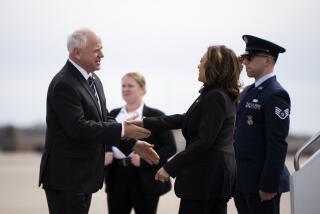Union Dissident Elected to UAW’s Executive Board
- Share via
Jerry Tucker, a veteran union activist who has become a symbol of discontent within the United Auto Workers, was elected to the UAW’s executive board Friday in Tulsa, Oklahoma, culminating a 27-month struggle that badly embarrassed the UAW leadership.
Tucker, 49, was elected director of the union’s eight-state, 80,000-member Region 5 at a special election held under the auspices of the Labor Department. He defeated 21-year incumbent Kenneth Worley by a 362-to-327 vote and was immediately sworn into office by UAW President Owen Bieber, who had actively supported Worley.
In June, 1986, Tucker was narrowly defeated by Worley at an election held at a union convention in Anaheim. Tucker immediately protested that union officials had violated federal law during the heated contest. The Labor Department launched an investigation and later that year filed three suits against the union stemming from the election.
Then, last March, a federal district judge in Detroit ordered the UAW to rerun the election, the first time that had happened in the union’s 53-year history.
“My victory certainly signifies that the membership is looking for someone who’s willing to question the direction of the union and argue for more accountability,” Tucker said in a telephone interview from Tulsa. His supporters called themselves the New Directions movement and declared that the union leadership was not sufficiently accountable to the members, had gotten too cozy with corporate chieftains and were not devoting enough energy to organizing.
Tucker, who was fired from his position as Worley’s assistant when he decided to run against him, called the work by his supporters “one of the finest expressions of unionism in recent memory.”
At a news conference after the vote, Bieber said he hoped “tranquility” would soon be restored to the highly factionalized Region 5, which is based in St. Louis. He said he did not think the vote had been “a referendum” against new work practices that Tucker has criticized. Bieber said the union no longer had the leverage it did when U.S. auto companies had “a virtual monopoly” of the world market and that it was seeking to strike a balance between traditional militancy and “innovative ways” of dealing with corporations.
May Encourage Challenges
Tucker’s victory was “one of the most significant elections in the UAW in 30 years,” said Harley Shaiken, professor of labor and technology at the UC San Diego. “Jerry Tucker ran on an alternative program that challenged the basic direction of the union in recent years and he won on that program and gained national visibility and attention.” Tucker has been considered a leader of an “alternative strategies” movement in recent years, where unionists used tactics such as slowdowns to fight off concessions demands by management in situations where strikes were considered foolhardy.
Shaiken said he thought that Tucker’s triumph would “encourage other challenges” by dissidents against incumbent regional directors in next year’s UAW elections. He also said he thought Tucker, who has been a UAW member since 1960 when he started out as an assembly line worker in St. Louis, would be supported by other members of the current union board on certain issues.
After meeting with his supporters Friday afternoon, Tucker said one of their first tasks will be “energizing the membership” to elect Massachusetts Governor Michael S. Dukakis president in November. “Working people have been abused under Reagan,” he said. “There are important states in our region; we can help deliver Texas and Missouri.”
As to more traditional union matters, Tucker said detailed surveys of the members would be conducted on the Japanese-style work practices that have been coming into use. “We’ve heard from a lot of people that the ‘brave new workplace’ is not serving the worker’s day-to-day needs as much as the (international) union’s needs and the corporation’s needs,” he said.
More to Read
Sign up for Essential California
The most important California stories and recommendations in your inbox every morning.
You may occasionally receive promotional content from the Los Angeles Times.










